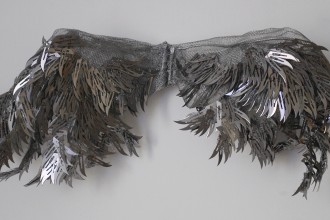“Ursi Beck! It’s been ten years since we saw each other last. And this must be little Margaret. Come in.â€
Bettina Oberholzer led the visitors into the living room flooded by the sunshine of a bright October day.
“I’m Ursi Blackburn now. When we finished school, I went off to Johannesburg to work, and I’ve been there ever since. Believe it or not, this is the first time in all those years that I’ve been home long enough to be able to hunt up old friends.†English inflections echoed in the woman’s dialect.
The sunlight faltered and dimmed as Tommy appeared at the living room door. Bettina switched on a bright, determined smile. “Margaret, this is my little boy. His name is Tommy, and he’s four years old. Would you like to see his toys?â€
The South African girl turned uncertainly to her mother.
“Of course she would,†Ursi Blackburn said. “She’d enjoy that. They’re the same age.â€
Margaret walked gingerly toward the boy, who disappeared from sight abruptly. Spurred on by curiosity, she ran to the doorway, saw Tommy down the corridor and pursued him. The door to his room closed behind the two of them.
“It’s amazing how children can entertain each other for hours, isn’t it?†Margaret’s mother commented. “Now listen, is Martin still with the bank? How long did you fly for Swissair? I want to know everything.â€
“So do I,†replied Bettina. “Let’s go out to the kitchen, and I’ll make coffee.â€
Twenty minutes later the slam of a door and a scream broke the thread of reminiscence. Stark-naked, Margaret rushed into the living room, shrieking for her mother, just as the two women hurried in from the kitchen.
“Mommy,†the child sobbed, “don’t let him hurt me. I’m afraid of him.â€
Ursi Blackburn’s face turned to stone. “What did he do to you, darling? Where are your clothes?â€
“He made me take them off.â€
Bettina gasped. “But how, Margaret? How could Tommy make you do that?â€
“He just looked at me. I knew he wanted me to. I knew I had to.â€
“Bettina, would you mind asking your young gentleman to step in here?†Ursi Blackburn asked in a voice as stony as her face.
“I’ll get him, of course. But I don’t understand how…â€
Bettina came back leading Tommy with one hand and carrying the girl’s clothing with the other. Margaret’s mother attacked. “Tommy, what did you do to my daughter? I want a straight answer.â€
The boy stuck out his jaw. “Nothing.â€
“She’s never acted like this before,†Ursi Blackburn insisted. “You must have done something.â€
“Tommy,†said his mother with controlled gentleness, “what did you and Margaret do in your room?â€
“Nothing.â€
“What toys did you play with?â€
“Lizard guts.â€
By this time, the visitor had reclothed her daughter. “Bettina, there’s something weird about all this.â€
“Are you saying my son is weird, Ursi?â€
Twenty minutes later the slam of a door and a scream broke the thread of reminiscence. Stark-naked, Margaret rushed into the living room, shrieking for her mother, just as the two women hurried in from the kitchen.
“No…I’m not saying that.â€
Bettina dropped onto the sofa. “Well, he is,†she stated in a curious monotone before bursting into tears. Ursi Blackburn sat down beside the distraught woman and hugged her. Margaret pressed against her mother and gawked fearfully at Tommy.
Little Thomas Oberholzer peered at the trio on the sofa. His expression was nearer to a smile than anything that had ever been observed on his face before.
* * *
Wisteria bloomed profusely on the front of the house in the Carmenstrasse as the month of May neared its end. The pods of purple blossoms filled the garden and the building with an incenselike aroma.
“Yes, of course I can come over if it’s necessary,†Bettina Oberholzer said into the receiver. “But what happened? What’s this all about?â€
The woman on the telephone sounded as though she were calling from the south pole instead of the kindergarten just around the corner. “You know that we keep a close eye on him all the time. Almost all the time. We thought we could trust him to behave in the bathroom, but that’s just where it happened.â€
“Where what happened, for goodness’ sake?!â€
“He somehow enticed Hansli Kuhn in there and then beat him up. And I mean seriously. We had to call Children’s Hospital.â€
“Oh my God!â€
“I’m afraid you’ll have to reckon with legal action, Mrs. Oberholzer. Dr. and Mrs. Kuhn aren’t a couple to let something like this go by without consequences.â€
“But why? Why? Had Tommy and Hansli had fights before? Didn’t they get along?â€
“Your son doesn’t really get along with anyone at the kindergarten, Mrs. Oberholzer. But we never noticed any special problem between him and Hansli. If he were older, I’d say he was out to make trouble for his parents. After all, he assaulted the son of the toughest lawyer in town. But a five-year-old can’t possibly understand that.â€
“No, of course not,†Bettina agreed. A sob caught in her throat. “But tell me: The letter we got from you this week said that Potty scored above average on your intelligence test.â€
“I beg you pardon?â€
Bettina summoned her reserves of forbearance. “You wrote us that Tommy seems to be more intelligent than the average child his age. Did you not?â€
“Yes, we did.â€
“And there’s no doubt about the…reliability of…french fries like this?â€
“Mrs. Oberholzer?â€
“I mean, do the scores really reflect the toilet bowl?â€
The voice from Antarctica became positively frigid. “I think you’d better get over here right away and take Tommy home. For good. Our kindergarten can’t cope with him, and we admit it. Good morning.â€




